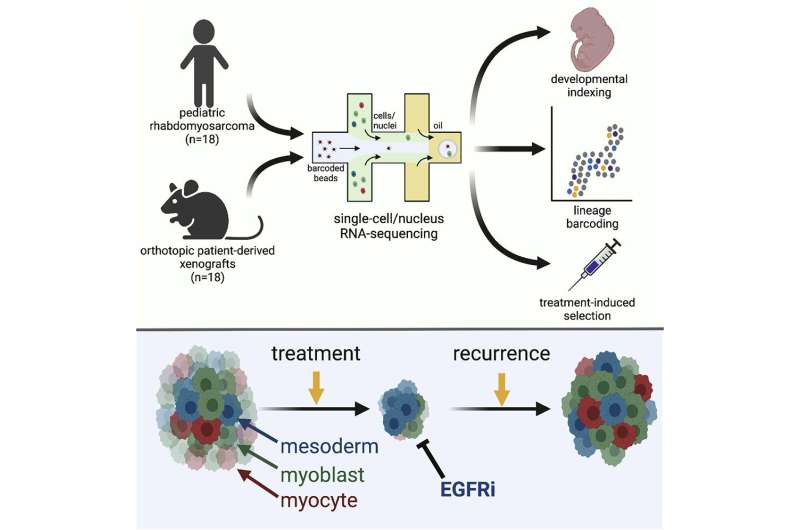Lab findings suggest EGFR inhibitors may prevent rhabdomyosarcoma recurrence


Rhabdomyosarcoma is a type of soft tissue cancer. Scientists at St. Jude Children’s Research Hospital studied the population of cells that persists after therapy, causing rhabdomyosarcoma recurrence. They found that these cells mirror an early developmental state that responds to EGFR inhibitors. The work presents a strategy for targeting the whole tumor that may apply to other pediatric cancers. The study was published today in Developmental Cell.
Rhabdomyosarcoma is the most common type of soft tissue sarcoma in children. After patients complete therapy, cancer cells can persist. These cells later multiply, causing the disease to recur. When this cancer recurs after therapy, it is much more difficult to treat.
The researchers wanted to better understand the cells that give rise to recurrent rhabdomyosarcoma to identify new treatments to prevent the cancer from returning after therapy. They used newly available techniques, such as single-nucleus RNA-sequencing and epigenetic profiling, on matched patient samples and orthotopic patient-derived xenografts that are part of the St. Jude Childhood Solid Tumor Network (CSTN). They found that these patient-derived models more accurately capture the biology and complexity of the human tumor.
“This project has its roots in the Pediatric Cancer Genome Project, which showed us that these populations of cells that survive therapy drive recurrence. In addition, working with our clinical colleagues revealed that understanding and being able to prevent recurrence is a major unmet need for this cancer,” said corresponding author Michael Dyer, Ph.D., St. Jude Department of Developmental Neurobiology chair and co-leader of the Developmental Biology and Solid Tumor Program.
“As a developmental biologist I was impressed with the degree to which the tumor cells are progressing through the normal stages of muscle development,” Dyer said. “In fact, those normal developmental programs are contributing to rhabdomyosarcoma recurrence. The most immature cells survive treatment and then become re-activated to progress through the muscle development program and re-establish the tumor after treatment. Our goal is to kill all cells in the tumor with particular focus on the rare cell population that seeds recurrence.”
Developmental states reveal a therapeutic opportunity
Embryonic cells express certain proteins and other factors that guide the cells toward an identity, such as a muscle cell. The researchers found that the population of cells driving the recurrence of rhabdomyosarcoma had features that mirror the early stage of muscle development. Chemotherapy can eliminate most of the rhabdomyosarcoma cells in a patient’s tumor. But the cells with features of early development persist.
The team found that this population of cells depends on epidermal growth factor receptor (EGFR) signaling and is sensitive to EGFR inhibitors. EGFR inhibitors are a type of targeted therapy used to treat cancers with mutations in the EGFR gene, such as lung cancer in adults. The findings support a clinical trial strategy that includes EGFR inhibitors in rhabdomyosarcoma treatment.
The work shows the importance of therapeutic strategies that treat the entirety of the tumor. Targeting the different developmental stages of the tumor cells is an approach that may apply to other types of pediatric cancer besides rhabdomyosarcoma.
“We were able to carefully pinpoint all of the different levels of development present among these cancer cells, going back to cells that recapitulate the earliest stages of development, and those are the cells that seem to survive treatment and can regrow the tumor,” said first author Anand Patel, M.D., Ph.D., St. Jude Department of Oncology. “We have a proof of concept that if you target those rare cells that persist with an EGFR inhibitor and combine that with chemotherapy you get a much better outcome because you’re treating the entire tumor. This reflects a different way of thinking about therapy that isn’t focused just on initial response.”
For this work, Patel was named one of the American Association for Cancer Research’s (AACR) NextGen Stars for 2022. He presented the work at the AACR annual meeting.
The research relied on computational approaches that used machine learning and systems biology. The data generated through this work is freely available through St. Jude Cloud. St. Jude Cloud provides data and analysis resources to the global research community.
Source: Read Full Article